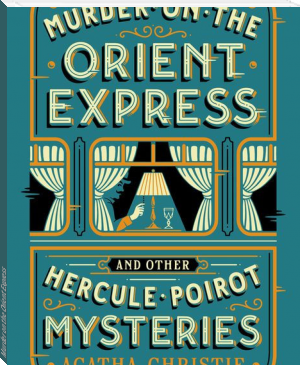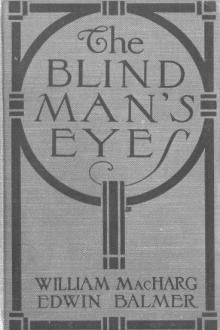Murder on the Orient Express, Agatha Christie [romance novel chinese novels txt] 📗

- Author: Agatha Christie
Book online «Murder on the Orient Express, Agatha Christie [romance novel chinese novels txt] 📗». Author Agatha Christie

His polite "Pardons" were uttered with the regularity of clockwork. At last he reached the compartment indicated. Inside it, reaching up to a suitcase, was the tall young American of the Tokatlian.

He frowned as Poirot entered.
"Excuse me," he said. "I think you've made a mistake." Then, laboriously in French: "Je crois qua vous avez un erreur."

Poirot replied in English. "You are Mr Harris?"

"No, my name is MacQueen. I -"

But at that moment the voice of the Wagon Lit conductor spoke from over Poirot's shoulder - an apologetic, rather breathless voice.

"There is no other berth on the train, Monsieur. The gentleman has to come in here."

He was hauling up the corridor window as he spoke and began to lift in Poirot's luggage.

Poirot noticed the apology in his tone with some amusement. Doubtless the man had been promised a good tip if he could keep
 the compartment for the sole use of the other traveller. However, even the most munificent of tips lose their effect when a Director of the Company is on board and issues his orders.
the compartment for the sole use of the other traveller. However, even the most munificent of tips lose their effect when a Director of the Company is on board and issues his orders.

The conductor emerged from the compartment, having swung the suitcases up onto the racks.

"Voilа, Monsieur," he said. "All is arranged. Yours is the upper berth, the No. 7. We start in one minute."

He hurried off down the corridor. Poirot re-entered the compartment.

"A phenomenon I have seldom seen," he said cheerfully. "A Wagon Lit conductor himself puts up the luggage! It is unheard of!"

His fellow traveller smiled. He had evidently got over his annoyance
had probably decided that it was no good to take the matter otherwise than philosophically. "The train's remarkably full," he said.

A whistle blew, there was a long melancholy cry from the engine. Both men stepped out into the corridor. Outside a voice shouted, "En voiture!"

"We're off," said MacQueen.
But they were not quite off. The whistle blew again.

 "I say, sir," said the young man suddenly. "If you'd rather have the lower berth - easier and all that - well, that's all right by me."
"I say, sir," said the young man suddenly. "If you'd rather have the lower berth - easier and all that - well, that's all right by me."
A likeable young fellow.

"No, no," protested Poirot. "I would not deprive you -"

"That's all right -"
"You are too amiable -"

Polite protests on both sides.

"It is for one night only," explained Poirot. "At Belgrade -"
"Oh! I see. You're getting out at Belgrade -"

"Not exactly. You see -"

There was a sudden jerk. Both men swung round to the window, looking out at the long lighted platform as it slid slowly past them.

The Orient Express had started on its three-day journey across Europe.

Chapter 3

POIROT REFUSES A CASE

M. Hercule Poirot was a little late in entering the luncheon-car on the following day. He had risen early, had breakfasted almost alone, and had spent the morning going over the notes of the case that was recalling him to London. He had seen little of his travelling companion.

M. Bouc, who was already seated, gesticulated a greeting and summoned his friend to the empty place opposite him. Poirot sat down and soon found himself in the favoured position of being at the table which was served first and with the choicest morsels. The food, too, was unusually good.

It was not till they were eating a delicate cream cheese that M. Bouc allowed his attention to wander to matters other than nourishment. He was at the stage of a meal when one becomes philosophic.

"Ah!" he sighed. "If I had but the pen of a Balzac! I would depict this scene." He waved a hand.

"It is an idea, that," said Poirot.

"Ah, you agree? It has not been done, I think? And yet - it lends itself to romance, my friend. All around us are people, of all classes, of all nationalities, of all ages. For three days these people, these strangers to one another, are brought together. They sleep and eat under one roof, they cannot get away from each other. At the end of

 three days they part, they go their several ways, never perhaps to see each other again."
three days they part, they go their several ways, never perhaps to see each other again."
"And yet," said Poirot, "suppose an accident -"

"Ah, no, my friend -"

"From your point of view it would be regrettable, I agree. But nevertheless let us just for one moment suppose it. Then, perhaps, all these here are linked together - by death."

"Some more wine," said M. Bouc, hastily pouring it out. "You are morbid, mon cher. It is, perhaps the digestion."

"It is true," agreed Poirot, "that the food in Syria was not perhaps quite suited to my stomach."

He sipped his wine. Then, leaning back, he ran his eye thoughtfully round the dining-car. There were thirteen people seated there and, as M. Bouc had said, of all classes and nationalities. He began to study them.

At the table opposite them were three men. They were, he guessed, single travellers graded and placed there by the unerring judgment of the restaurant attendants. A big swarthy Italian was picking his teeth with gusto. Opposite him a spare neat Englishman had the expressionless disapproving face of the well-trained servant. Next to the Englishman was a big American in a loud suit - possibly a commercial traveller.

 "You've got to put it over big," he was saying in a loud, nasal voice.
"You've got to put it over big," he was saying in a loud, nasal voice.
The Italian removed his toothpick to gesticulate with it freely.

"Sure," he said. "That whatta I say alla de time."
The Englishman looked out of the window and coughed.

Poirot's eye passed on.

At a small table, sitting very upright, was one of the ugliest old ladies he had ever seen. It was an ugliness of distinction - it fascinated rather than repelled. She sat very upright. Round her neck was a collar of very large pearls which, improbable though it seemed, were real. Her hands were covered with rings. Her sable coat was pushed back on her shoulders. A very small and expensive black toque was hideously unbecoming to the yellow, toad-like face beneath it.

She was speaking now to the restaurant attendant in a clear, courteous, but completely autocratic tone.

"You will be sufficiently amiable to place in my compartment a bottle of mineral water and a large glass of orange juice. You will arrange that I shall have chicken cooked without sauces for dinner this evening - also some boiled fish."

The attendant replied respectfully that it should be done.

 She gave a slight gracious nod of the head and rose. Her glance caught Poirot's and swept over him with the nonchalance of the uninterested aristocrat.
She gave a slight gracious nod of the head and rose. Her glance caught Poirot's and swept over him with the nonchalance of the uninterested aristocrat.

"That is Princess Dragomiroff," said M. Bouc in a low tone. "She is a Russian. Her husband realised all his money before the Revolution and invested it abroad. She is extremely rich. A cosmopolitan."

Poirot nodded. He had heard of Princess Dragomiroff.

"She is a personality," said M. Bouc. "Ugly as sin but she makes herself felt. You agree?"

Poirot agreed.
At another of the large tables Mary Debenham was sitting with two other women. One of them was tall and middle-aged, in a plaid blouse and tweed skirt. She had a mass of faded yellow hair unbecomingly arranged in a large bun, wore glasses, and had a long mild amiable face rather like a sheep. She was listening to the third woman, a stout, pleasant-faced, elderly person who was talking in a slow clear monotone which showed no signs of pausing for breath or coming to a stop.

"- and so my daughter said, 'Why,' she said, 'you just can't apply American methods in this country. It's natural to the folks here to be indolent,' she said. 'They just haven't got any hustle in them -' But all the same you'd be surprised to know what our college there is doing. They've got a fine staff of teachers. I guess there's nothing

 like education. We've got to apply our Western ideals and teach the East to recognise them. My daughter says -"
like education. We've got to apply our Western ideals and teach the East to recognise them. My daughter says -"
The train plunged into a tunnel. The calm, monotonous voice was drowned.

At the next table, a small one, sat Colonel Arbuthnot - alone. His gaze was fixed upon the back of Mary Debenham's head. They were not sitting together. Yet it could easily have been managed. Why?

Perhaps, Poirot thought, Mary Debenham had demurred. A governess learns to be careful. Appearances are important. A girl with her living to get has to be discreet.

His glance shifted to the other side of the carriage. At the far end, against the wall, was a middle-aged woman dressed in black with a broad, expressionless face. German or Scandinavian, he thought. Probably the German lady's-maid.

Beyond her were a couple leaning forward and talking animatedly together. The man wore English clothes of loose tweed, but he was not English. Though only the back of his head was visible to Poirot, the shape of it and the set of the shoulders betrayed him. A big man, well made. He turned his head suddenly and Poirot saw his profile. A very handsome man of thirty-odd with a big fair moustache.

The woman opposite him was a mere girl - twenty at a guess. A tight-fitting little black coat and skirt, white satin blouse, small chic black toque perched at the fashionable outrageous angle. She had

 a beautiful foreign-looking face, dead white skin, large brown eyes, jet black hair. She was smoking a cigarette in a long holder. Her manicured hands had deep red nails. She wore one large emerald set in platinum. There was coquetry in her glance and voice.
a beautiful foreign-looking face, dead white skin, large brown eyes, jet black hair. She was smoking a cigarette in a long holder. Her manicured hands had deep red nails. She wore one large emerald set in platinum. There was coquetry in her glance and voice.

"Elle est jolie - et chic," murmured Poirot. "Husband and wife - eh?"

M. Bouc nodded. "Hungarian Embassy, I believe," he said. "A handsome couple."

There were only two more lunchers - Poirot's fellow traveller MacQueen and his employer Mr Ratchett. The latter sat facing Poirot, and for the second time Poirot studied that unprepossessing face, noting the false benevolence of the brow and the small, cruel eyes.

Doubtless M. Bouc saw a change in his friend's expression.
"It is at your wild animal you look?" he asked.

Poirot nodded.

As his coffee was brought to him, M. Bouc rose to his feet. Having started before Poirot he had finished some time ago.

"I return to my compartment," he said. "Come along presently and converse with me."

"With pleasure."
 Poirot sipped his coffee and ordered a liqueur. The attendant was passing from table to table with his box of money, accepting payment for bills. The elderly American lady's voice rose shrill and plaintive.
Poirot sipped his coffee and ordered a liqueur. The attendant was passing from table to table with his box of money, accepting payment for bills. The elderly American lady's voice rose shrill and plaintive.

"My daughter said: 'Take a book of food tickets and you'll have no trouble - no trouble at all.' Now, that isn't so. Seems they have to have a ten per cent tip, and then there's that bottle of mineral water

and a queer sort of water too. They didn't have any Evian or Vichy, which seems queer to me."

"It is - they must - how do you say? - serve the water of the country," explained the sheep-faced lady.

"Well, it seems queer to me." She looked distastefully at the heap of small change on the table in front of her. "Look at all this peculiar stuff he's given me. Dinars or something. Just a lot of rubbish, it looks like! My daughter said -"

Mary Debenham pushed back her chair and left with a slight bow to the other two. Colonel Arbuthnot got up and followed her. Gathering up her despised money the American woman





Comments (0)